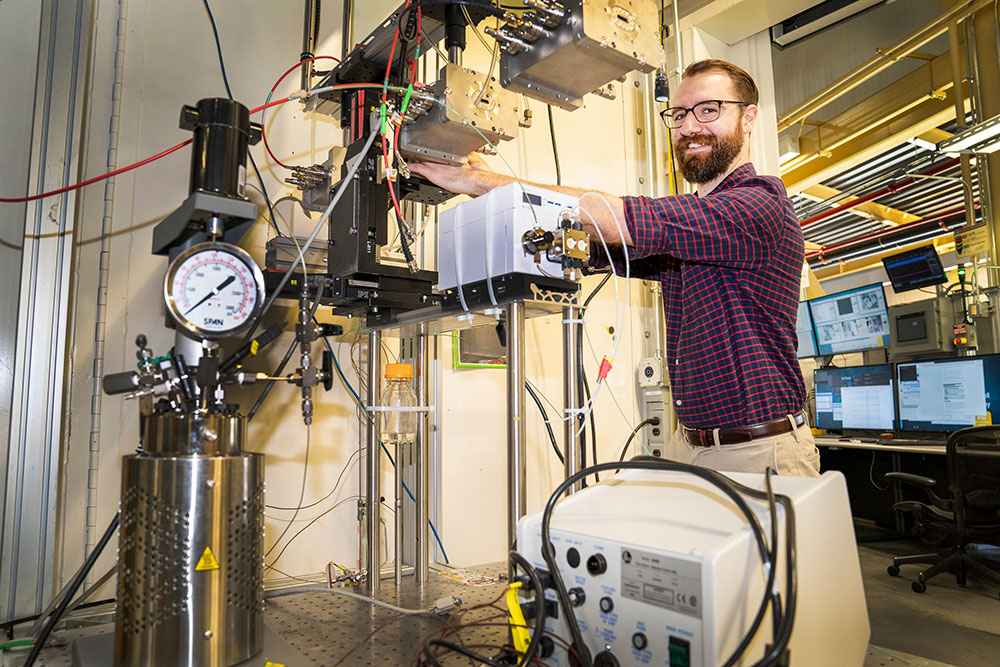Conquering Cleaner Catalysis
2024 Goldhaber Distinguished Fellowship awardee Steve Farrell reflects on how humanity's challenges drive his research
September 5, 2024
 enlarge
enlarge
Distinguished Goldhaber Fellow Steve Farrell makes some adjustments at the Inner-Shell Spectroscopy (ISS) beamline. (David Rahner/Brookhaven National Laboratory)
Steve Farrell, a research associate at the Inner-Shell Spectroscopy (ISS) beamline at the National Synchrotron Light Source II (NSLS-II), a U.S. Department of Energy (DOE) Office of Science user facility at DOE’s Brookhaven National Laboratory, has recently been selected as one of 2024’s Distinguished Goldhaber Fellows. These prestigious three-year fellowships are awarded to exceptional candidates who have demonstrated their expertise and talent as well as their drive to pursue independent research. At the end of their appointment, fellows are encouraged to apply for scientific staff positions at the Laboratory. Farrell is eager to use this time to pursue projects focused on clean, affordable energy that leverage his experience and expertise in chemistry and materials science.
“I came in the door with a lot of ideas, and the mentors and collaborators I worked with here at Brookhaven helped me streamline and craft them into a good, cohesive project built around so many of my hopes and dreams,” Farrell said. “I work on a lot of cool projects here, but I was able to better tune my vision to what could be helpful in the long run: humanity-centered projects in the scope of DOE’s mission—like affordable energy security—and clean energy.”
Farrell specializes in catalysis, the alteration of a chemical reaction’s speed using a substance that isn’t consumed in the process. That substance is known as a “catalyst.” Specifically, he’s looking at net-zero-carbon approaches, such as reusing greenhouse gases like carbon dioxide or methane, for important chemical processes that require catalysis in areas like manufacturing and energy production.
“I’m focused on the materials aspect of catalysis and getting a better understanding of how catalysts work,” said Farrell. “For centuries, people have used catalysis to produce chemicals and often had no idea how the process worked. We have these anecdotes from history; somebody tossed a powder in a keg one day and it made a chemical that they wanted, so they kept doing it. This isn’t really helpful for understanding how to make better catalysts, though. We want to understand how these catalysts work at the atomic level. In the past, these reactions were done at such high temperatures and pressures, I could never imagine doing something like that here. Now, we’re seeing that we can achieve a lot of these reactions at much lower temperatures. There are so many recent breakthroughs in this field, and I’m excited to contribute to that through this fellowship.”
Farrell’s Goldhaber Distinguished Fellowship research proposal, “developing vital carbon-neutral pathways to clean energy via the conversion of natural gas to value-added chemicals,” will leverage the resources and expertise of Brookhaven Lab’s Chemistry Division and synchrotron X-ray techniques at NSLS-II to gain that beneficial understanding. New, in situ, high pressure catalysis tools that are only available at the ISS beamline enable Farrell and his team to see high-pressure reactions happen in real time. Pressure plays an important role in the behavior of many catalysts, and many of the reactions Farrell is studying benefit from an increase of pressure in the system.
Performing research in a field that impacts so many people has made Farell an adept scientific communicator. Explaining what he does, why he does it, and how it could benefit the community in an accessible way is a skill that started very close to home.
“I have friends and family who are really excited about the latest in clean energy science and want to learn more about what I do,” said Farrell. “A big step in learning to communicate specialized research to people outside of your field is to have them repeat what you’ve said back to you. It helps you learn what you’ve communicated well and what might need some tuning up to make it more familiar and relatable.”
A long journey from a short distance
As a native New Yorker, Farrell is no stranger to Brookhaven Lab. Growing up in a town only minutes away, Farrell was first able to visit on a formative elementary school field trip.
“I remember my mom chaperoning this trip and watching me just light up and get so excited by everything that I was experiencing,” recalled Farrell. “I may not have realized it at the time, but she definitely saw that moment as a turning point for my interest in science.”
In high school, Farrell really enjoyed science classes focused on engineering. This led him to Drexel University in Philadelphia to pursue both his bachelor’s and master’s degrees in chemical engineering. He later returned to New York to work on his doctorate in materials chemistry at New York University, earning his Ph.D. this year. During that time, he earned the 2021 DOE Office of Science Graduate Student Research Program Award.
Farrell is grateful for the invaluable advice and experiences offered by several mentors who he encountered in pursuit of this fellowship.
“The team at ISS, led by Eli Stavitski, has been great to work with. They let me know what is practical and possible in some of the machinations of experiments we’re devising, and that has been so helpful,” Farrell said. “I’ve been fortunate to do work on other beamlines like the Tender Energy X-ray Absorption Spectroscopy (TES) and the Pair Distribution Function (PDF) beamlines as well, and everyone has been really helpful in advancing this research. The Chemistry Division at Brookhaven Lab has also been instrumental in this work. I’ve been collaborating with them since I was a Ph.D. student in 2023. It has been an amazing opportunity to leverage such a wide range of expertise and resources for a project that means so much to me.”
Brookhaven National Laboratory is supported by the Office of Science of the U.S. Department of Energy. The Office of Science is the single largest supporter of basic research in the physical sciences in the United States and is working to address some of the most pressing challenges of our time. For more information, visit science.energy.gov.
Follow @BrookhavenLab on social media. Find us on Instagram, LinkedIn, X, and Facebook.
2024-22036 | INT/EXT | Newsroom









